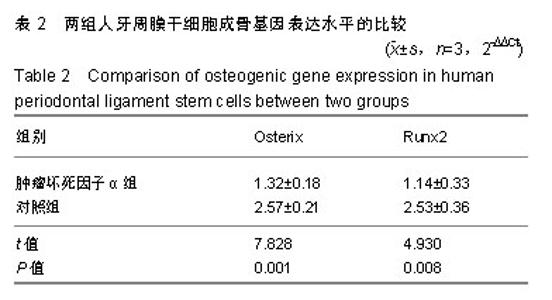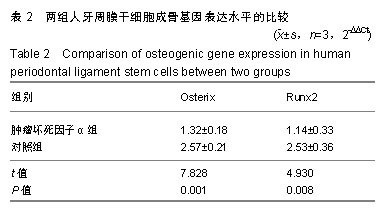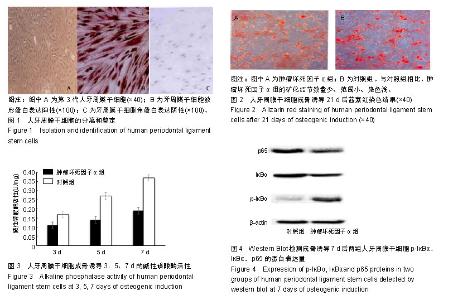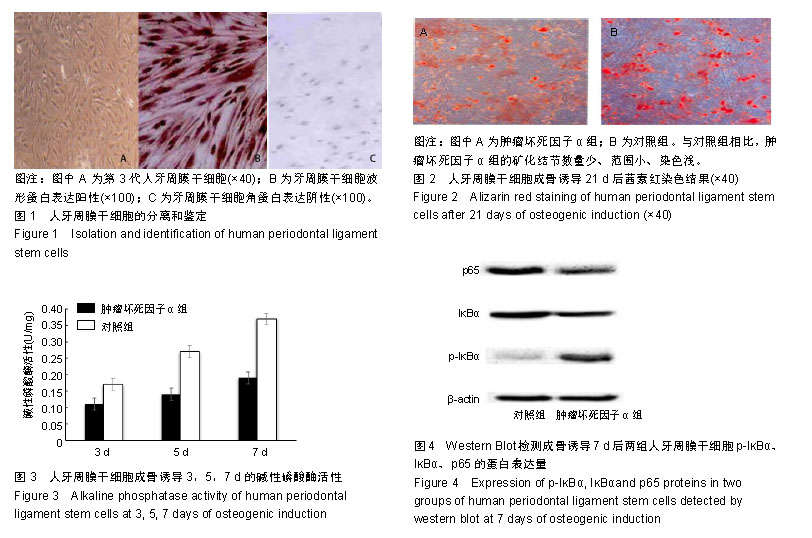| [1]苗雷英,孙卫斌.牙周组织工程研究进展[J].医学研究生学报, 2016,29(1): 3-9.[2]潘有条,王一飞,赵洵.微环境对牙周膜干细胞分化的抑制和诱导作用[J].国际口腔医学杂志,2016,43(2):207-211.[3]刘娜,李华,张洋,等. 炎症微环境作用下非经典Wnt/Ca2+信号通路对牙周膜干细胞成骨分化的影响[J].中华老年口腔医学杂志, 2015,13(5): 257-262.[4]聂嘉,张博,顾斌,等.p38 丝裂原活化蛋白激酶在炎症微环境作用下对牙周膜干细胞成骨分化的影响[J].中国医学科学院学报, 2015, 37(1):1-7.[5]冯娟,刘亚蕊,张清彬,等.炎性微环境对牙周膜干细胞骨向分化作用的初步研究[J].医学信息, 2015,28(26):23.[6]杨昊.炎症刺激对人牙龈间充质干细胞和牙周膜干细胞生物学性能的影响[D]. 西安:第四军医大学, 2013.[7]杨芳,陈明月,胡英英,等.PPARγ在脂多糖刺激牙周膜细胞中调控NF-κB信号通路的作用研究[J].口腔医学研究, 2017, 33(7):698-702.[8]王月昊,王小琴,苗伟,等.间歇性低氧对牙周炎大鼠牙周组织中NF-κB、IL-6及PGE2含量的影响[J].实用口腔医学杂志, 2016,32(1):28-31.[9]陈铁楼,苏丹,许兵.NF-κB分子生物学特性及其在牙周炎等炎症性疾病中的作用[J].口腔医学,2010,30(4):242-245.[10]Zhang J, Li ZG, Si YM, et al. The difference on the osteogenic differentiation between periodontal ligament stem cells and bone marrow mesenchymal stem cells under inflammatory microenviroments. Differentiation. 2014;88(4-5):97-105.[11]Chen X, Hu C, Wang G, et al. Nuclear factor-κB modulates osteogenesis of periodontal ligament stem cells through competition with β-catenin signaling in inflammatory microenvironments. Cell Death Dis. 2013;4:e510.[12]和璐,廖雁婷.牙周炎与2型糖尿病[J].中华糖尿病杂志, 2010,02(4):242-245.[13]袁萍,李淑慧,赵璐,等.炎症微环境下人牙周膜干细胞的生物学特性[J].中国组织工程研究, 2016, 20(6):898-905.[14]徐洁.慢性牙周炎与2型糖尿病的相互关系及影响因素分析[J].航空航天医学杂志, 2015,26(2):146-148.[15]吴丹,程功,李晶,等.牙菌斑培养菌群宏基因组文库构建及抗生素耐药基因筛选[J].微生物学通报, 2013, 40(6):1041-1048.[16]张欣然,刘翠,朱彪,等.肿瘤坏死因子-α诱导骨髓间充质干细胞凋亡作用的研究[J].牙体牙髓牙周病学杂志, 2015,25(7):391-395.[17]翟启明,李蓓,刘露,等.线粒体融合蛋白-1对牙周膜干细胞成骨分化能力的影响[J].实用口腔医学杂志, 2018,34(2):172-177.[18]杨柳青,徐雪,王黎明,等.慢性牙周炎患者龈沟液中IL-8和TNF-α水平变化及临床意义[J].现代生物医学进展, 2016, 16(30):5933-5936.[19]薛冬梅,欧阳燕.尼美舒利对慢性牙周炎患者疗效及龈沟液中IL-8和TNF-α水平的影响[J].中国生化药物杂志, 2016,36(4):77-79.[20]李晓光,王一珠,郭斌.慢性牙周炎中肿瘤坏死因子α对骨髓间充质干细胞成骨分化的调控作用[J].华西口腔医学杂志, 2017,15(3):114-118.[21]王琳源,靳赢,林晓萍.适应性免疫应答在牙周炎发生中的作用[J].中华口腔医学杂志,2013,48(2):115-118.[22]朱治宇,刘国勤.慢性牙周炎治疗前后患牙龈沟液中IL-8和TNF-α水平变化比较[J].细胞与分子免疫学杂志,2010,26(11):156-159.[23]Yeh CJ, Lin PY, Liao MH, et al. TNF-alpha mediates pseudorabies virus-induced apoptosis via the activation of p38 MAPK and JNK/SAPK signaling. Virology. 2008;381(1):55-66.[24]于钦,陈贤.牙周炎患者基础治疗前后唾液和龈沟液中IL-6、TNF-α、MMP-8水平的变化[J].北京口腔医学, 2018,26(6):336-339.[25]于莉,李淑慧,袁萍,等. TNF-α对根尖乳头干细胞体外增殖及成牙成骨向分化能力的影响[J].口腔医学研究,2016, 32(4):343-346.[26]王光.雌激素缺乏导致的骨质疏松环境中TNF-α通过MiR-21影响小鼠骨髓间充质干细胞成骨分化能力的研究[D]. 西安:第四军医大学, 2012.[27]曹蓉蓉,徐江,李淑慧,等. TNF-α影响鼠根尖乳头干细胞成骨/成牙本质能力的实验研究[J].口腔医学, 2017,37(3):208-213.[28]王有为.炎性因子TNF-α对SD大鼠骨髓间充质干细胞成骨分化的影响[D]. 沈阳:中国医科大学,2015.[29]张冬梅,刘静波,潘亚萍.牙龈卟啉单胞菌感染血管内皮细胞对NF-κB和p38MAPK信号通路的影响[J].中国医科大学学报, 2011,40(6):530-533.[30]Lin G, Chen S, Lei L, et al. Effects of Intravenous Injection of Porphyromonas gingivalis on Rabbit Inflammatory Immune Response and Atherosclerosis. Mediators Inflamm. 2015;2015:364391.[31]Egbuniwe O, Grover S, Duggal AK, et al. TRPA1 and TRPV4 activation in human odontoblasts stimulates ATP release. J Dent Res. 2014; 93(9):911-917.[32]刘亚丽,刘文佳,胡成虎,等.牙周慢性炎症对牙周膜干细胞生物学特性的影响[J].牙体牙髓牙周病学杂志,2014,24(1):21-25.[33]王愉惠.炎症微环境下牙周膜干细胞成骨分化的调控机制[J].临床口腔医学杂志, 2017,33(7):441-444.[34]刘娜.炎症微环境影响下Wnt信号通路对牙周膜干细胞骨向分化的调控机制研究[D].重庆:第三军医大学, 2011.[35]蒋琳,周鹏飞,王佳,等. BMPs-ERK5信号通路调控人牙周膜干细胞成骨分化的研究[J].第三军医大学学报, 2016,38(7):718-725.[36]陈林,薛纯纯,舒冰,等. TNF-α与干细胞成骨分化[J].中国骨质疏松杂志, 2016, 22(5):619-623.[37]王晓晨,吉爱国.NF-κB信号通路与炎症反应[J].生理科学进展, 2014,45(1): 68-71.[38]李琦,谢志坚.骨质疏松与NF-κB信号通路关系的研究进展[J].中国老年学杂志, 2015,35(9):2551-2554.[39]王锦华,张芳,李霞,等. NF-κB非经典途径IKKα调控的Maspin在人牙周膜细胞中的表达[J].口腔医学研究, 2017,33(10):1052-1055.[40]张静,陈彬,段银钟,等.炎性环境下牙周膜、骨髓间充质干细胞骨向分化差异性的研究[J].口腔医学研究, 2014,30(10):939-944.[41]金小福,蒋琼,罗心静.丙酮酸乙酯对滑膜细胞HMGB1的影响及机制[J].浙江医学,2014, 36(11):933-936. |



